- Home
- Wilkie Collins
Nine O'Clock
Nine O'Clock Read online
Nine O’Clock!
By Wilkie Collins
© 2007 by http://www.HorrorMasters.com
The night of the 30th of June, 1793, is memorable in the prison annals of Paris, as the last night in confinement of the leaders of the famous Girondin party in the first French Revolution. On the morning of the 31st, the twenty-one deputies who represented the department of the Gironde, were guillotined to make way for Robespierre and the Reign of Terror.
With these men fell the last revolutionists of that period who shrank from founding a republic on massacre; who recoiled from substituting for a monarchy of corruption, a monarchy of bloodshed. The elements of their defeat lay as much in themselves, as in the events of their time. They were not, as a party, true to their own convictions; they temporized; they fatally attempted to take a middle course amid the terrible emergencies of a terrible epoch, and they fell—fell before worse men, because those men were in earnest.
Condemned to die, the Girondins submitted nobly to their fate; their great glory was the glory of their deaths. The speech of one of them on hearing his sentence pronounced, was a prophecy of the future, fulfilled to the letter.
‘I die,’ he said to the Jacobin judges, the creatures of Robespierre, who tried him. ‘I die at a time when the people have lost their reason; you will die on the day when they recover it.’ Valazé was the only member of the condemned party who displayed a momentary weakness; he stabbed himself on hearing his sentence pronounced. But the blow was not mortal—he died on the scaffold, and died bravely with the rest.
On the night of the 30th the Girondins held their famous banquet in the prison; celebrated, with the ferocious stoicism of the time, their last social meeting before the morning on which they were to die. Other men, besides the twenty-one, were present at this supper of the condemned. They were prisoners who held Girondin opinions, but whose names were not illustrious enough for history to preserve. Though sentenced to confinement they were not sentenced to death. Some of their number, who had protested most boldly against the condemnation of the deputies, were ordered to witness the execution on the morrow, as a timely example to terrify them into submission. More than this, Robespierre and his colleagues did not, as yet, venture to attempt: the Reign of Terror was a cautious reign at starting.
The supper-table of the prison was spread; the guests, twenty-one of their number stamped already with the seal of death, were congregated at the last Girondin banquet; toast followed toast; the Marseillaise was sung; the desperate triumph of the feast was rising fast to its climax, when a new and ominous subject of conversation was started at the lower end of the table, and spread electrically, almost in a moment, to the top.
This subject (by whom originated no one knew) was simply a question as to the hour in the morning at which the execution was to take place. Every one of the prisoners appeared to be in ignorance on this point; and the gaolers either could not, or would not, enlighten them. Until the cart for the condemned rolled into the prison-yard, not one of the Girondins could tell whether he was to be called out to the guillotine soon after sunrise, or not till near noon.
This uncertainty was made a topic for discussion, or for jesting on all sides. It was eagerly seized on as a pretext for raising to the highest pitch the ghastly animation and hilarity of the evening. In some quarters, the recognised hour of former executions was quoted as a precedent sure to be followed by the executioners of the morrow; in others, it was asserted that Robespierre and his party would purposely depart from established customs in this, as in previous instances. Dozens of wild schemes were suggested for guessing the hour by fortune-telling rules on the cards; bets were offered and accepted among the prisoners who were not condemned to death, and witnessed in stoical mockery by the prisoners who were. Jests were exchanged about early rising and hurried toilets; in short, every man contributed an assertion, a contradiction, or a witticism to keep up the new topic of conversation, with one solitary exception. That exception was the Girondin, Duprat, one of the deputies who was sentenced to die by the guillotine.
He was a younger man than the majority of his brethren, and was personally
remarkable by his pale, handsome, melancholy face, and his reserved yet gentle manners.
Throughout the evening, he had spoken but rarely; there was something of the silence and serenity of a martyr in his demeanour. That he feared death as little as any of his companions was plainly visible in his bright, steady eye; in his unchanging complexion; in his firm, calm voice, when he occasionally addressed those who happened to be near him. But he was evidently out of place at the banquet; his temperament was reflective, his disposition serious; feasts were at no time a sphere in which he was calculated to shine.
His taciturnity, while the hour of the execution was under discussion, had separated him from most of those with whom he sat, at the lower end of the table. They edged up towards the top, where the conversation was most general and most animated. One of his friends, however, still kep this place by Duprat’s side, and thus questioned him anxiously, but in low toncs, on the cause of his immovable silence:
‘Are you the only man of the company, Duprat, who has neither a guess nor a joke to make about the time of the execution?’
‘I never joke, Marigny,’ was the answer, given with a slight smile which had something of the sarcastic in it; ‘and as for guessing at the time of the execution, I never guess at things which I know.’
‘Know! You know the hour of the execution! Then why not communicate your
knowledge to your friends around you?’
‘Because not one of them would believe what I said.’ ‘But, surely, you could prove it.
Somebody must have told you.’ ‘Nobody has told me.
‘You have seen some private letter, then; or you have managed to get sight of the execution-order; or—‘Spare your conjectures, Marigny. I have not read, as I have not been told, what is the hour at which we are to die to-morrow.’
‘Then how on earth can you possibly know it?’
‘I do not know when the execution will begin, or when it will end. I only know that it will be going on at nine o’clock to-morrow morning. Out of the twenty-one who are to suffer death, one will be guillotined exactly at that hour. Whether he will be the first whose head falls, or the last, I cannot tell.’
‘And pray who may this man be, who is to die exactly at nine o’clock? Of course, prophetically knowing so much, you know that!’
‘I do know it. I am the man whose death by the guillotine will take place exactly at the hour I have mentioned.’
‘You said just now, Duprat, that you never joked. Do you expect me to believe that what you have just spoken is spoken in earnest?’
‘I repeat that I never joke; and I answer that I expect you to believe me. I know the hour at which my death will take place tomorrow, just as certainly as I know the fact of my own existence tonight.’
‘But how? My dear friend, can you really lay claim to supernatural intuition, in this eighteenth century of the world, in this renowned Age of Reason?’
‘No two men, Marigny, understand that word, supernatural, exactly in the same sense; you and I differ about its meaning, or, in other words, differ about the real distinction between the doubtful and the true. We will not discuss the subject: I wish to be understood, at the outset, as laying claim to no superior intuitions whatever; but I tell you, at the same time, that even in this Age of Reason, I have reason for what I have said. My father and my brother both died at nine o’clock in the morning, and were both warned very strangely of their deaths. I am the last of my family; I was warned last night, as they were warned; and I shall die by the guillotine, as they died in their beds, at the fatal hour of nine.’
‘But, Duprat, why have
I never heard of this before? As your oldest and, I am sure, your dearest friend, I thought you had long since trusted me with all your secrets.’
‘And you shall know this secret; I only kept it from you till the time when I could be certain that my death would substantiate my words, to the very letter. Come! you are as bad supper-company as I am; let us slip away from the table unperceived, while our friends are all engaged in conversation. Yonder end of the hall is dark and quiet—we can speak there uninterruptedly, for some hours to come.’
He led the way from the supper-table, followed by Marigny. Arrived at one of the darkest and most retired corners of the great hall of the prison, Duprat spoke again:
‘I believe, Marigny,’ he said, ‘that you are one of those who have been ordered by our tyrants to witness my execution, and the execution of my brethren, as a warning spectacle for an enemy to the Jacobin cause?’
‘My dear, dear friend! it is too true; I am ordered to witness the butchery which I cannot prevent—our last awful parting will be at the foot of the scaffold. I am among the victims who are spared—mercilessly spared—for a little while yet.’
‘Say the martyrs! We die as martyrs, calmly, hopefully, innocently. When I am placed under the guillotine to-morrow morning, listen, my friend, for the striking of the church clocks; listen for the hour while you look your last on me. Until that time, suspend your judgment on the strange chapter of family history which I am now about to relate.’
Marigny took his friend’s hand, and promised compliance with the request. Duprat then began as follows:
‘You knew my brother Alfred, when he was quite a youth, and you knew something of what people flippantly termed, the eccentricities of his character. He was three years my junior; but, from childhood, he showed far less of a child’s innate levity and happiness than his elder brother. He was noted for his seriousness and thoughtfulness as a boy; showed little inclination for a boy’s usual lessons, and less still for a boy’s usual recreations,—in short, he was considered by everybody (my father included) as deficient in intellect- as a vacant dreamer, and an inveterate idler, whom it was hopeless to improve. Our tutor tried to lead him to various studies, and tried in vain. It was the same when the cultivation of his mind was given up, and the cultivation of his body was next
attempted. The fencing-master could make nothing of him; and the dancing-master, after the first three lessons, resigned in despair. Seeing that it was useless to set others to teach him, my father made a virtue of necessity, and left him, if he chose, to teach himself.
‘To the astonishment of every one, he had not been long consigned to his own guidance, when he was discovered in the library, reading every old treatise on astrology which he could lay his hands on. He had rejected all useful knowledge for the most obsolete of obsolete sciences—the old, abandoned delusion of divination by the stars! My father laughed heartily over the strange study to which his idle son had at last applied himself, but made no attempt to oppose his new caprice, and sarcastically presented him with a telescope on his next birthday. I should remind you here, of what you may perhaps have forgotten, that my father was a philosopher of the Voltaire school, who believed that the summit of human wisdom was to arrive at the power of sneering at all enthusiasms, and doubting of all truths. Apart from his philosophy, he was a kind-hearted, easy man, of quick, rather than of profound intelligence. He could see nothing in my brother’s new occupation, but the evidence of a new idleness, a fresh caprice which would be abandoned in a few months. My father was not the man to appreciate those yearnings towards the poetical and the spiritual, which were part of Alfred’s temperament, and which gave to his peculiar studies of the stars and their influences, a certain charm altogether unconnected with the more practical attractions of scientific investigation.
‘This idle caprice of my brother’s, as my father insisted on terming it, had lasted more than a twelvemonth, when there occurred the first of a series of mysterious and—as I consider them—supernatural events, with all of which Alfred was very remarkably connected. I was myself a witness of the strange circumstance, which I am now about to relate to you.
‘One day—my brother being then sixteen years of age—I happened to go into my father’s study, during his absence, and found Alfred there, standing close to a window, which looked into the garden. I walked up to him, and observed a curious expression of vacancy and rigidity in his face, especially in his eyes. Although I knew him to be subject to what are called fits of absence, I still thought it rather extraordinary that he never moved, and never noticed me when I was close to him. I took his hand, and asked if he was unwell. His flesh felt quite cold; neither my touch nor my voice produced the smallest sensation in him. Almost at the same moment when I noticed this, I happened to be looking accidentally towards the garden. There was my father walking along one of the paths, and there, by his side, walking with him, was another Alfred!—Another, yet exactly the same as the Alfred by whose side I was standing, whose hand I still held in mine!
‘Thoroughly panic-stricken, I dropped his hand, and uttered a cry of terror. At the loud sound of my voice, the statue-like presence before me immediately began to show signs of animation. I looked round again at the garden. The figure of my brother, which I had beheld there, was gone, and I saw to my horror, that my father was looking for it—
looking in all directions for the companion (spectre, or human being?) of his walk!
‘When I turned towards Alfred once more, he had (if I may so express it) come to life again, and was asking, with his usual gentleness of manner and kindness of voice, why I was looking so pale? I evaded the question by making some excuse, and in my turn inquired of him, how long he had been in my father’s study.
“‘Surely you ought to know best,” he answered with a laugh, “for you must have been here before me. It is not many minutes ago since I was walking in the garden with—”’
‘Before he could complete the sentence my father entered the room.
“‘Oh! here you are, Master Alfred,” said he. “May I ask for what purpose you took it into your wise head to vanish in that extraordinary manner? Why you slipped away from me in an instant, while I was picking a flower! On my word, sir, you’re a better player at hide-and-seek than your brother,—he would only have run into the shrubbery, you have managed to run in here, though how you did it in the time passes my poor
comprehension. I was not a moment picking the flower, yet in that moment you were gone!”’
‘Alfred glanced suddenly and searchingly at me; his face became deadly pale, and, without speaking a word, he hurried from the room.
“‘Can you explain this?” said my father, looking very much astonished.
‘I hesitated a moment, and then told him what I had seen. He took a pinch of snuff—a favourite habit with him when he was going to be sarcastic, in imitation of Voltaire.
“‘One visionary in a family is enough,” said he; “I recommend you not to turn yourself into a bad imitation of your brother Alfred! Send your ghost after me, my good boy! I am going back into the garden, and should like to see him again!”’
‘Ridicule, even much sharper than this, would have had little effect on me. If I was certain of anything in the world, I was certain that I had seen my brother in the study—
nay, more, had touched him,—and equally certain that I had seen his double—his exact similitude, in the garden. As far as any man could know that he was in possession of his own senses, I knew myself to be in possession of mine. Left alone to think over what I had beheld, I felt a supernatural terror creeping through me—a terror which increased, when I recollected that, on one or two occasions friends had said they had seen Alfred out of doors, when we all knew him to be at home. These statements, which my father had laughed at, and had taught me to laugh at, either as a trick, or a delusion on the part of others, now recurred to my memory as startling corroborations of what I had just seen myself. The solitude of the study oppressed me in a man
ner which I cannot describe. I left the apartment to seek Alfred, determined to question him, with all possible caution, on the subject of his strange trance, and his sensations at the moment when I had awakened him from it.
‘I found him in his bed-room, still pale, and now very thoughtful. As the first words in reference to the scene in the study passed my lips, he started violently, and entreated me, with very unusual warmth of speech and manner, never to speak to him on that subject again,—never, if I had any love or regard for him! Of course, I complied with his request.
The mystery, however, was not destined to end here.
‘About two months after the event which I have just related, we had arranged, one evening, to go to the theatre. My father had insisted that Alfred should be of the party, otherwise he would certainly have declined accompanying us; for he had no inclination whatever for public amusements of any kind. However, with his usual docility, he prepared to obey my father’s desire, by going up-stairs to put on his evening dress. It was winter-time, so he was obliged to take a candle with him.
‘We waited in the drawing-room for his return a very long time, so long, that my father was on the point of sending up-stairs to remind him of the lateness of the hour, when Alfred reappeared without the candle which he had taken with him from the room. The
ghastly alteration that had passed over his face—the hideous, death-look that distorted his features I shall never forget,—I shall see it to-morrow on the scaffold!
‘Before either my father or I could utter a word, my brother said: ‘I have been taken suddenly ill; but I am better now. Do you still wish me to go to the theatre?’
“‘Certainly not, my dear Alfred,” answered my father; “we must send for the doctor immediately.”
“‘Pray do not call in the doctor, sir; he would be of no use. I will tell you why, if you will let me speak to you alone.”
‘My father, looking seriously alarmed, signed to me to leave the room. For more than half an hour I remained absent, suffering almost unendurable suspense and anxiety on my brother’s account. When I was recalled, I observed that Alfred was quite calm, though still deadly pale. My father’s manner displayed an agitation which I had never observed in it before. He rose from his chair when I re-entered the room, and left me alone with my brother.

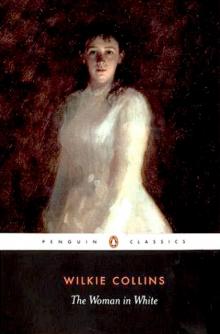 The Woman in White
The Woman in White The Queen of Hearts
The Queen of Hearts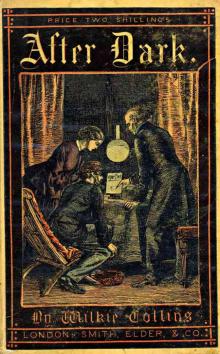 Miss Jeromette and the Clergyman
Miss Jeromette and the Clergyman Man and Wife
Man and Wife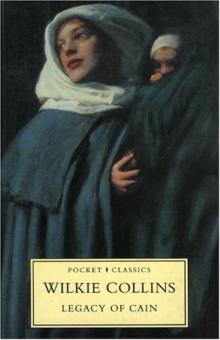 The Legacy of Cain
The Legacy of Cain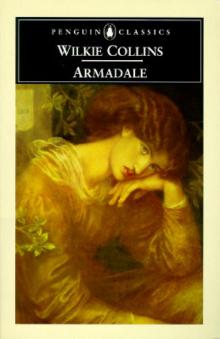 Armadale
Armadale The Frozen Deep
The Frozen Deep John Jago's Ghost or the Dead Alive
John Jago's Ghost or the Dead Alive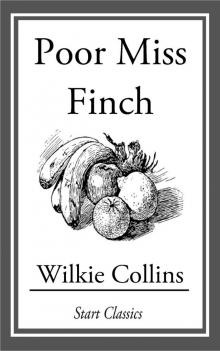 Poor Miss Finch
Poor Miss Finch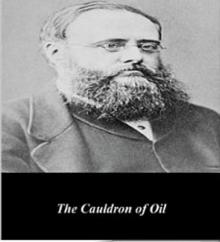 The Cauldron of Oil: A Case Worth Looking At
The Cauldron of Oil: A Case Worth Looking At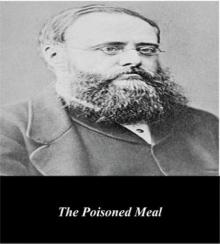 The Poisoned Meal
The Poisoned Meal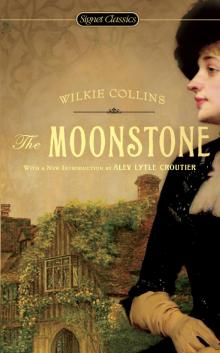 The Moonstone
The Moonstone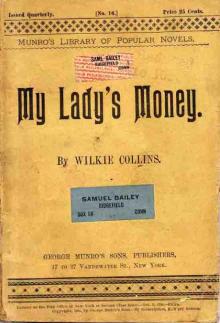 My Lady's Money
My Lady's Money Classic Ghost Stories
Classic Ghost Stories Jezebel's Daughter
Jezebel's Daughter The Devil's Spectacles
The Devil's Spectacles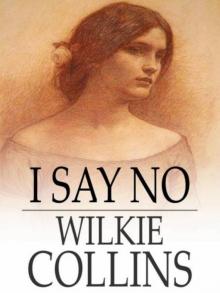 I Say No
I Say No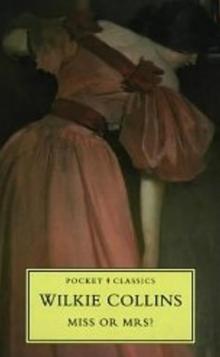 Miss or Mrs.?
Miss or Mrs.?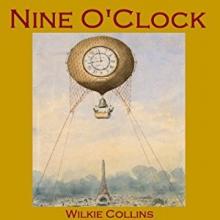 Nine O'Clock
Nine O'Clock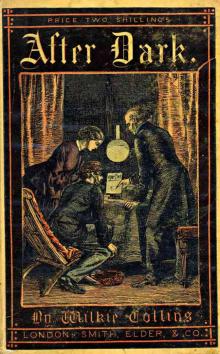 The Lawyer's Story of a Stolen Letter
The Lawyer's Story of a Stolen Letter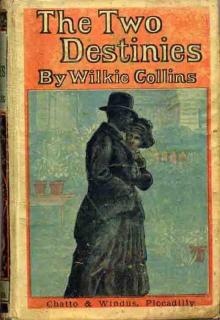 The Two Destinies
The Two Destinies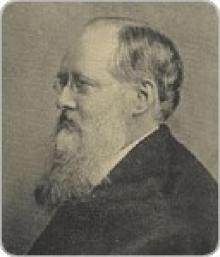 Mr. Percy and the Prophet
Mr. Percy and the Prophet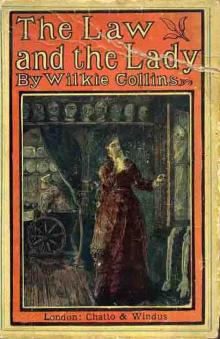 The Law and the Lady
The Law and the Lady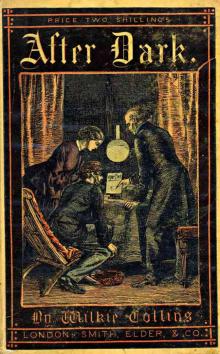 The Nun's Story of Gabriel's Marriage
The Nun's Story of Gabriel's Marriage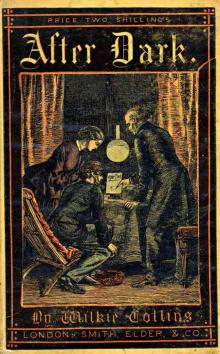 After Dark
After Dark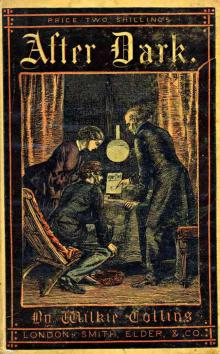 Mr. Captain and the Nymph
Mr. Captain and the Nymph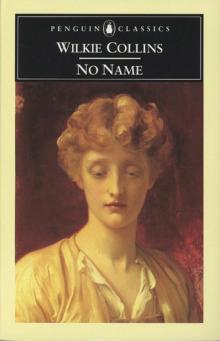 No Name
No Name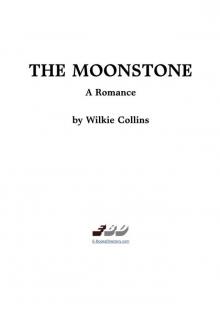 The Moonstone (Penguin Classics)
The Moonstone (Penguin Classics) Antonina
Antonina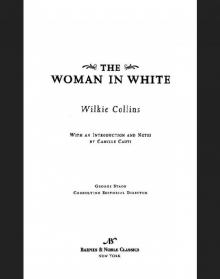 Woman in White (Barnes & Noble Classics Series)
Woman in White (Barnes & Noble Classics Series)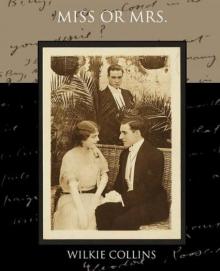 Miss or Mrs
Miss or Mrs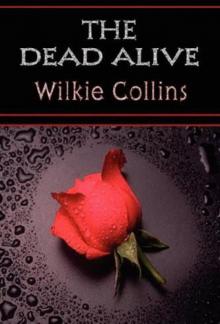 The Dead Alive
The Dead Alive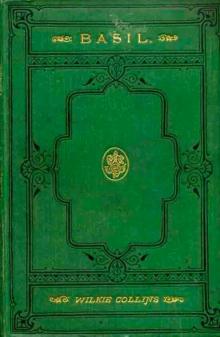 Basil
Basil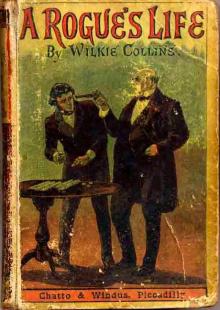 A Rogue's Life
A Rogue's Life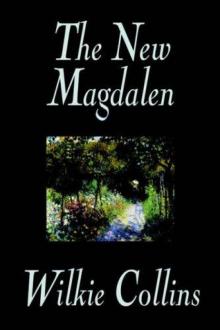 The New Magdalen
The New Magdalen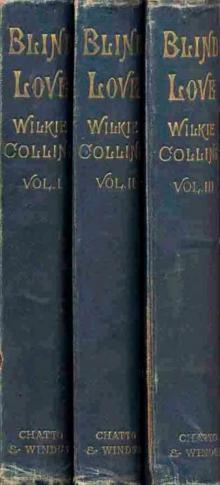 Blind Love
Blind Love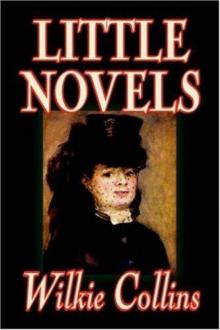 Little Novels
Little Novels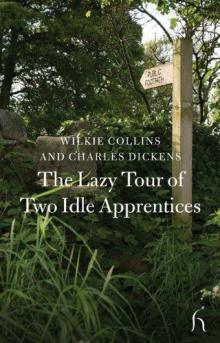 The Lazy Tour of Two Idle Apprentices
The Lazy Tour of Two Idle Apprentices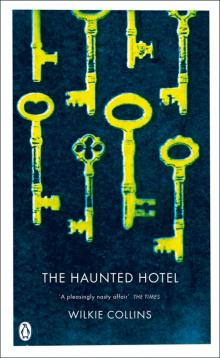 The Haunted Hotel
The Haunted Hotel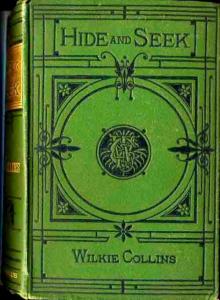 Hide and Seek
Hide and Seek